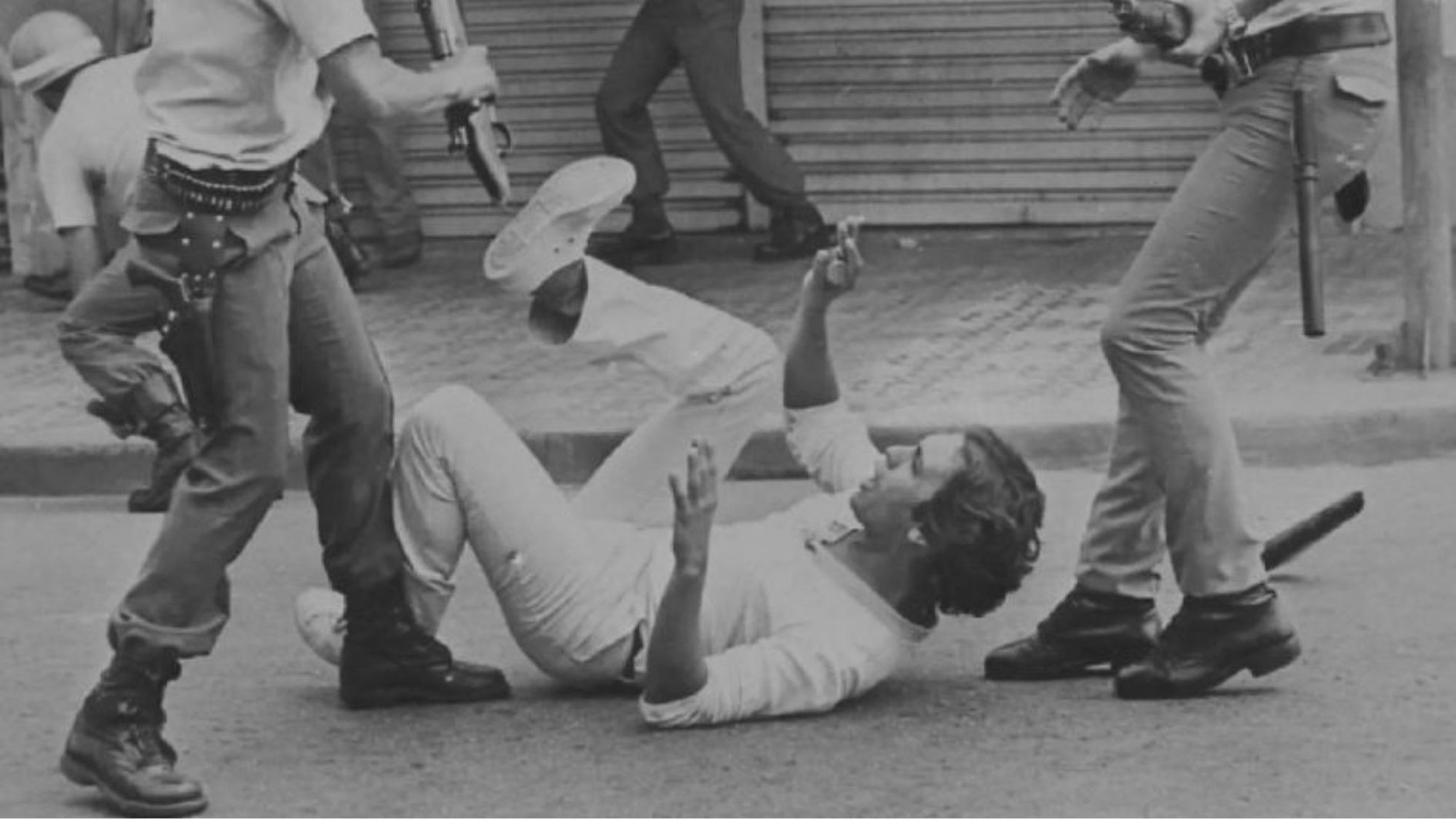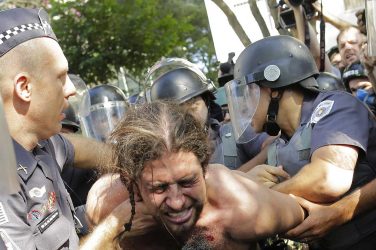The Brazilian transition from the civil-military dictatorship to the New Republic in the 1990s could have been a period to revise the authoritarianism embedded in the country’s society since its formation. However, the authoritarian traits – boosted during the dictatorship – are legacies Brazil has to this day.
Behind these traits, there is a society and successive governments that refuse to come to terms with the past. President Luiz Inácio Lula da Silva (Workers’ Party) has recently said he cannot “always dwell” on the dictatorial past. The comment was in response to being asked about the cancellation of the ceremony to mark the 60th anniversary of the 1964 coup, planned for April 1st this year.
“What I cannot do is not move forward with [Brazil’s] history. I cannot always dwell on it, that is, it’s a part of Brazil’s history about what we still lack information about since there are still missing people, things to be investigated. But, honestly, I will not dwell on it. I’ll try to move this country forward,” said Lula in an interview with the Brazilian TV show É Notícia.
Ivo Lebauspin, who was arrested and tortured during the dictatorship, says “It’s an error not to elaborate on the dictatorship period. There is a narrative saying it’s better to reconcile with the past and forget what happened. That’s impossible to achieve without knowing what really happened.”
“Some people think that, in order to move forward with a political plan, it’s necessary to sweep [the dictatorship] under the carpet, put all this behind us, look ahead and make agreements. It was already done. It has been done for years. The dictatorship hasn’t been analyzed since its end [1985]. No trials, nothing,” he explained.
Lebauspin associates the military presence in the coup attempt to keep Jair Bolsonaro (Liberal Party) in the presidency as a remnant of the military intervention. “It has everything to do with not remembering the dictatorship and not bringing it to justice. In Germany, there is a monumental effort to constantly remember what happened. There are Holocaust museums in various places, and people know what happened. There was a trial, facts were analyzed and judged. There was no such thing here.”
Similarly, Daniel Aarão Reis Filho, a professor in the History Department at Fluminense Federal University (UFF, in Portuguese), says that he remembers “leaders of progressive parties, like Tancredo Neves in 1985, calling on people not to look in the rear-view mirror, but to look ahead and not dwell on the wounds.” That shows that Brazil “paid little attention to reflecting on the state structure set up during the dictatorship and its policies.”
Armed Forces
As a result, authoritarian traits are still present in Brazilian society, not only from the military dictatorship period but also from other governments, such as Getúlio Vargas’ Estado Novo and the slavery period. Among these legacies, the professor lists the autonomy of the Armed Forces.
“They are a true state within the state. They have their own educational structure and a specific justice system, allowing the Armed Forces to cultivate increasingly anachronistic ideologies, which are very much in force within the Armed Forces.”
Aarão Reis Filho explains that only Dilma Rousseff’s government (Workers’ Party) – but timidly – made efforts to revise the military structure, especially with the creation of the National Truth Commission (CNV, in Portuguese) on November 18, 2011. Even so, the history professor says “There was a kind of pact: we don’t mess with you, you don’t mess with us. This pact was based on the illusory hope that, over time, wounds would heal.”
A year after the end of the commission’s activities, in 2014, researcher and CNV member Lucas Figueiredo stated that the 4,328-page final report was “a weak one”.
“[Late Brazilian President] Tancredo Neves is the kid’s father, since he didn’t talk openly about investigating [military activities during the dictatorship]. [Former President José] Sarney was a sellout politician because he was too weak, and therefore had to rely on the military.
After him, [former Presidents Fernando] Collor and Itamar [Franco] used the state to prevent documents from becoming public, which is a more serious stance. And there was Dilma, who was absolutely passive because the Armed Forces lied to her during the commission – and she did nothing,” said Figueiredo to the BBC when the report was released.
This passiveness on the part of Brazilian governments after the dictatorship was compounded by the articulation of the far right within military headquarters, which gained ground mainly during the military dictatorship. Professor Daniel Aarão Reis Filho says the far-right preferences among the military “is very strong”. “Nothing indicates this tendency has been neutralized.”
“There has been a general effort to transform the Brazilian Armed Forces, which used to be plural, into monoliths. The military schools continue to intoxicate [soldiers] with Cold War theories, which are anti-communist and continue to feed the idea that the military is the master of civility, the savior of peace, the guardian of the Republic. They set up an extremely centralized, monolithic educational system, without pluralism or a cult of legality. This is one of the dictatorship’s legacies that is extremely harmful to democracy,” says the UFF professor.
Capitalism
Another legacy professor Aarão Reis Filho mentions is social and regional inequalities. “The dictatorship propelled Brazilian capitalism to a higher level. Unlike the Argentinean dictatorship, which pushed Argentinean capitalism downwards, here in Brazil, capitalism leapt forward, but at the cost of social inequalities.”
Throughout the dictatorship, there was a rapprochement between the industrial and agrarian bourgeoisie, coupled with the participation of foreign capital in the economy, followed by economic dependence on hegemonic countries. In this scenario, the state worked to guarantee the demands and profits of the elites to the detriment of the rights of the working class, increasing economic inequality in Brazil.
The damage to the working class was seen in the fall in wages, loss of land among rural workers due to the increase in large estates and repression. According to the Inter-Union Department of Statistics and Socio-Economic Studies (Dieese, in Portuguese), the minimum wage fell by around 40% between 1964 and 1974, from BRL 2,142 (US$ 427) to BRL 1,247 (US$ 248), adjusted for inflation and the different currencies Brazil has had over the decades.
To Aarão Reis Filho, since then, Brazil has never got to “radically invert the course of social inequalities.”
“Brazilian capitalism continues, fundamentally, following the same pattern of that created by the dictatorship: in the hegemony of financial capital, which continues to suck our wealth through interest on the public debt. Half of the Brazilian budget is used to pay interest on public debt. There is a process of hegemony in the so-called market, which is fundamentally speculative, and does not stand out for productive investments. This hegemony was enshrined during the dictatorship,” he concludes.
Public security
Among the legacies, the history professor mentions public security. “In Brazil, we have always had a tradition in which the police, instead of protecting citizenship, choose to repress citizenship. This scheme, older than the dictatorship, was tremendously boosted during and after the dictatorship. There is the autonomy of the military police and the creation of shock troops, such as the infamous BOPEs [Special Police Operations Battalions], which always terrorize the poorest populations,” he says.
In the same vein, Rodrigo Lentz, a lawyer, professor of Political Science at the University of Brasilia (UnB) and researcher at the Tricontinental Research Institute, says that public security in the country reveals “the maintenance of state terrorism in a cooperation involving the Public Prosecutor’s Office, the Judiciary and the Security Forces, in a broad process of creating a climate of terror in Brazilian poor neighborhoods.”
This process relies on the “totally illegal actions of the military police, which systematically violate the human rights of a certain social group, where democracy has not arrived from the point of view of democratic freedoms and individual guarantees.”
Maria de Belém Souto at the funeral ceremony of his son, Edson Luíz, a student killed by the dictatorship. / Arquivo Nacional/Correio da Manhã
The researcher argues that the history of torture, summary execution, arbitrary arrests or the falsification of criminal situations as acts of self-defense are legitimized when the state carries them out. “All of this is a record of our Republic. Torture as an institutional mechanism, above all, was implemented during the dictatorship of the Estado Novo [“New State”, in English], under the Vargas government.”
“Extermination as a public security policy began in the 1950s, when Amaury Kruel was head of the Federal Capital Police Department. These were practices that existed before and were maintained during the dictatorship and continues today,” he says.
Lentz relates this violent and authoritarian history to what is happening in the Baixada Santista region (São Paulo state) with Operation Shield, which killed 45 people in 36 days, from February 7 to March 14 this year. “There is social legitimization, a production of consensus, which leads society to validate these practices,” he says.
The governor of São Paulo state Tarcísio de Freitas (Republicans Party) declared that he “doesn’t care” about complaints of police lethality made to the United Nations. In 2023, the first phase of Operation Shield killed 28 people between July 28 and September 5 in response to the death of a Rota police officer. The second phase of the operation killed one person every 19.2 hours.
Low intensity democracy
Faced with a situation surrounded by authoritarian legacies, it is questionable whether the Brazilian political regime is a democracy. “No society goes through 20 years of an authoritarian regime unscathed, considering Brazil’s history. Certain things structure the government, the state and society,” says Lentz.
The researcher argues that Brazil is “far” from the idea of democracy in its etymological sense, as a government of the people. “[Brazil] is very far from what we experience in pluralist liberal democracies, where Brazil fits in best, which are democracies governed by elites, with electoral competition, a system of a state subject to majority electoral rules and guarantees of some individual freedoms in a selective way.”
To Portuguese sociologist Boaventura de Sousa Santos, who created the concept of “low-intensity democracy”, the Brazilian case seems to fit into it. “Above all, low intensity democracy is characterized by low social participation, that is, it’s a representative democracy, but one that does not count on social participation and, therefore, has low legitimacy,” he says.
“The lower the social participation in state institutions and decision-making processes, the lower the reach of policies of this democracy to its population,” Boaventura explains.
The researcher also points out that this situation generates a kind of “social disenchantment and legitimization of authoritarian solutions”, which urgently requires structural change. “I wouldn’t say Brazil lives in an authoritarian regime, but the country also lives in a very precarious and selective democracy. That’s one of the reasons it’s permanently threatened by the far right today.”
In December last year, a Datafolha poll showed that the number of people for whom it doesn’t matter whether Brazil is a democracy or a dictatorship has increased. In October 2022, the percentage was 11% among those interviewed. Last year, it rose to 15%. The number of respondents who consider a dictatorial regime acceptable under certain circumstances has also risen: from 5% to 7%.
Brasil de Fato






